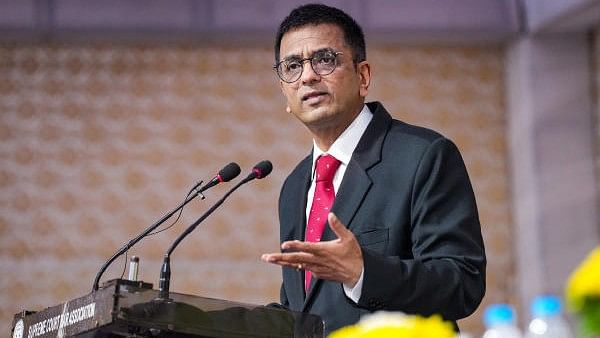
Chief Justice of India (CJI) Justice D Y Chandrachud
PTI
New Delhi: Chief Justice of India D Y Chandrachud on Thursday cited the current situation in Bangladesh to highlight the significance of liberty and the vital role played by the judges and lawyers in preservation of freedom.
Speaking at a function organised by the Supreme Court Bar Association to mark the 78th Independence Day in the national capital, the CJI said it is simple to take liberty for granted, but it is important for us to dwell on the stories of the past to remind us how precious liberty is and the important role judges and lawyers play in the institution in preserving the liberty.
He said the task of the patriotic advocates did not end with India achieving her independence, they have been a constant source of good in our country even after independence.
“The courts are vital to upholding the rights and dignity of citizens, but the Bar wedded to the Constitution and rule of law, is vital to uphold the conscience of the courts,” he said.
The CJI referred to a piece by noted Karnataka vocalist Chitra Sri Krishna -'Songs of Freedom' - to emphasise on the idea of liberty, woven into the fabric of Indian poetry.
He also paid tributes to freedom fighters, who gave up their legal practices and joined the freedom struggle.
"Many lawyers gave up their legal practices and dedicated themselves to the cause of the nation. Babasaheb Ambedkar, Jawaharlal Nehru, Alladi Krishnaswamy Iyer, Govind Vallabh Pant, Devi Prasad Khaitan, Sir Syed Mohammed Saadullah and many others. They were instrumental not only in achieving freedom for India, but also in establishing a fiercely independent judiciary," he said.
Referring to his own journey as a judge for the past 24 years, he said, "I can keep my hand on my heart and say that the work of the courts reflects the struggles of ordinary Indians navigating the rough and tumble of their daily lives. The Supreme Court of India sees throngs of litigants from villages and metropolitan cities of all regions, castes, genders and religions seeking justice."
Emphasising on the importance of accessible and inclusive infrastructure for the modern judiciary, he announced that a new building will come up on the Supreme Court premises with 27 futuristic courts with modern facilities for litigants, members of the Bar and women lawyers.
